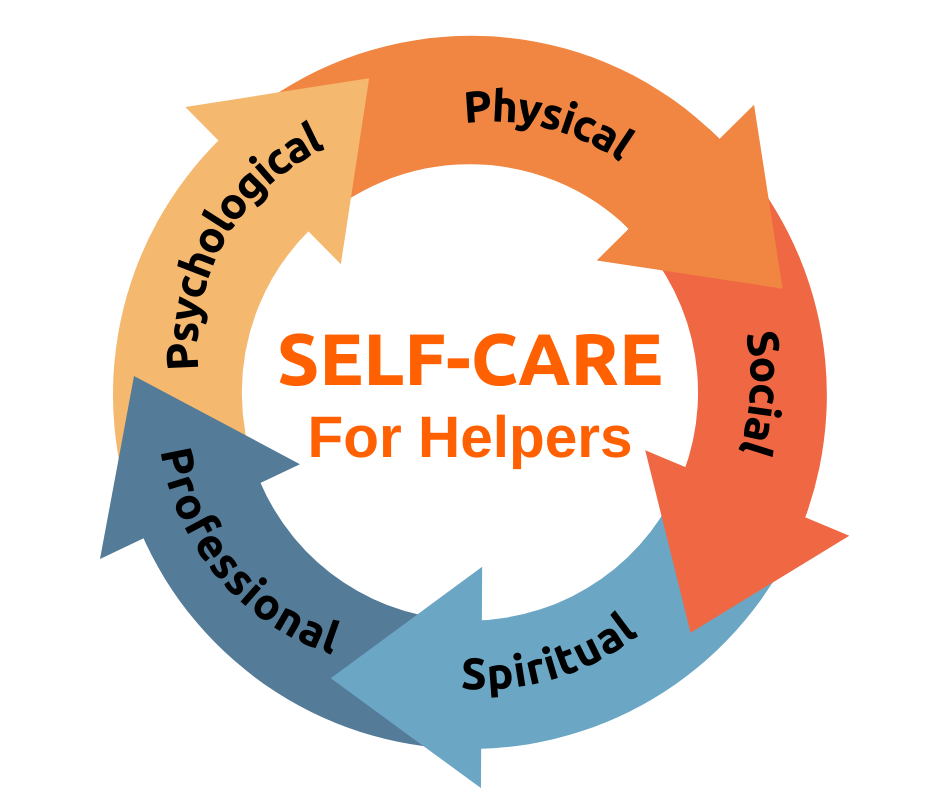Self-Care Essentials For Helping Professionals
Self-Care Essentials For Helping Professionals
The importance of self-care cannot be overstated. Self-care encompasses various dimensions of well-being, including Physical, Social, Spiritual, Professional, and Psychological aspects. By nurturing each area, you can achieve a balanced and fulfilling life. This article explores practical strategies from our workshops to enhance each dimension and help you craft a personalized self-care plan.
Introduction
Self-care is more than just a buzzword; it is a crucial practice for maintaining overall well-being. By addressing all aspects of self-care, you can improve your quality of life and resilience to stress. This comprehensive approach ensures that you are caring for your entire self, not just one or two aspects.
Physical Self-Care
Importance: Physical self-care involves activities that improve your physical health and well-being. This includes exercise, nutrition, sleep, and regular medical check-ups.
Strategies:
Exercise Regularly: Engage in at least 30 minutes of moderate exercise most days of the week. Activities like walking, yoga, or cycling can boost your energy and improve mood.
Eat Balanced Meals: Prioritize a diet rich in fruits, vegetables, lean proteins, and whole grains. Avoid excessive consumption of sugar, caffeine, and processed foods.
Sleep Hygiene: Aim for 7-9 hours of quality sleep each night. Establish a bedtime routine and create a restful environment to enhance sleep quality.
Regular Check-ups: Schedule regular visits with healthcare providers to monitor and maintain your health.
Social Self-Care
Importance: Social self-care focuses on building and maintaining healthy relationships and social connections. Strong social support can improve mental health and provide a sense of belonging.
Strategies:
Build Connections: Foster relationships with family, friends, and colleagues. Regularly spend time with loved ones and participate in social activities.
Set Boundaries: Learn to say no and set boundaries to protect your time and energy. Communicate your needs clearly and respect others' boundaries.
Seek Support: Don’t hesitate to reach out for support when needed. Join support groups or talk to a counselor to share experiences and gain perspective.
Spiritual Self-Care
Importance: Spiritual self-care involves nurturing your spirit, which can provide a sense of purpose and meaning in life. This can be achieved through religious practices, meditation, or spending time in nature.
Strategies:
Meditation and Mindfulness: Practice meditation or mindfulness to connect with your inner self. Even a few minutes each day can bring clarity and peace.
Engage in Spiritual Practices: Participate in activities that align with your spiritual beliefs, such as prayer, attending religious services, or reading spiritual texts.
Nature Connection: Spend time in nature to rejuvenate your spirit. Activities like hiking, gardening, or simply walking in a park can be very grounding.
Professional Self-Care
Importance: Professional self-care involves finding a healthy balance between work and personal life. It also includes pursuing activities that enhance your career satisfaction and development.
Strategies:
Work-Life Balance: Set boundaries to ensure you have time for both work and personal activities. Prioritize tasks and delegate when necessary to avoid burnout.
Career Development: Invest in professional growth by attending workshops, and seminars, or pursuing further education. Seek mentorship and feedback to improve skills.
Positive Work Environment: Foster a supportive and positive work environment. Build relationships with colleagues and advocate for a healthy workplace culture.
Psychological Self-Care
Importance: Psychological self-care focuses on maintaining your mental and emotional health. This includes managing stress, practicing self-compassion, and engaging in activities that promote mental well-being.
Strategies:
Stress Management: Practice stress-reducing techniques such as deep breathing, progressive muscle relaxation, or engaging in hobbies you enjoy.
Self-Compassion: Be kind to yourself. Practice self-affirmation and avoid self-criticism. Recognize your accomplishments and accept your imperfections.
Therapeutic Activities: Engage in activities that support your mental health, such as journaling, art, music, or seeking therapy when needed.
Crafting a Personalized Self-Care Plan
To create a personalized self-care plan, consider the following steps:
Assess Your Needs: Reflect on each dimension of self-care and identify areas that need more attention.
Set Goals: Define specific, achievable goals for each area. For example, aim to exercise three times a week or spend 30 minutes daily on mindfulness.
Create a Schedule: Allocate time in your daily or weekly schedule for self-care activities. Consistency is key to making self-care a habit.
Evaluate and Adjust: Regularly review your self-care plan and make adjustments as needed. Be flexible and adapt your strategies to fit changing circumstances.
Now You Know:
Self-care is essential for nurturing every aspect of your life. By incorporating strategies from our workshops into your daily routine, you can enhance your physical, social, spiritual, professional, and psychological well-being. Invest in yourself and take proactive steps towards a balanced, fulfilling life.
Call to Action: Join Mezzo Solutions' "Craft Your Self-Care Masterpiece" workshop to explore these strategies in depth and develop a personalized self-care plan. Our expert facilitators provide a supportive environment for shared insights and self-discovery. Elevate your well-being with Mezzo Solutions. Start your journey today.



